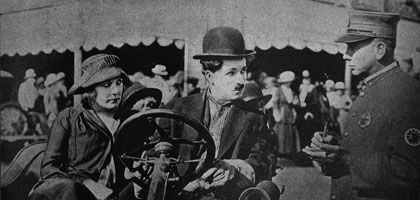67. A Day's Pleasure (1919)
First National 1918-23

Synopsis
Charlie, his wife and two small sons go on a day trip to the coast in their Model-T Ford. They board a pleasure boat, Charlie momentarily returning to shore for cigarettes returns and uses a fat lady (who has fallen trying to get on the boat) as a gangplank. On board a jazz band starts playing and couples dance to the frenzied beat, which induces seasickness in Charlie. He wanders around and seems to be pursued by people selling food. He sits by a girl whose boyfriend (also nauseous) has gone off. An attendant covers them both with a blanket which gives the wrong impression to the boyfriend when he returns. They fight but have to take time out to lean over the rail. Back on shore, Charlie and the family are delayed by a policeman directing traffic at a crossroads. The queue of traffic becomes fractious and Charlie backs into a lorry, causing a chain reaction of falling crates and tar spillage. The policeman becomes trapped in the tar while his colleague falls down a manhole. Charlie wanders into the tar and becomes trapped. He pushes the policeman further into the tar and as he struggles to pull him out becomes more stuck himself. The first policeman climbs out of the manhole and goes for Charlie, but sticks fast. Charlie steps out of a boot, gets back in the car, and drives off.
chaplin_credits
- Cast:
- Charles Chaplin (Father)
- Edna Purviance (Mother)
- Marion Feducha (Small Boy)
- Bob Kelly (Small Boy)
- Jackie Coogan (Smallest Boy)
- Tom Wilson (Large Husband)
- Babe London (His Seasick Wife)
- Henry Bergman (Captain and Man in Car)
- Loyal Underwood (Angry Little Man in Street)
- Albert Austin
- Jessie Van Trump
- At the start of shooting, the role of Charlie's wife was taken by the 495lb Tom Wood
- Location:
- San Pedro pleasure boat, Ace.
- Production started:
- 21 May 1919
- Production interrupted:
- 30 July-7 October 1919
- Production finished:
- 19 October 1919
- Released:
- 15 December 1919
- Length:
- 1714 ft
- Musical score by Chaplin, arranged by Eric James, recorded in August 1973 at Anvil Studios, Denham, England.